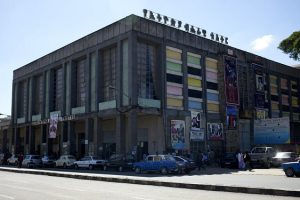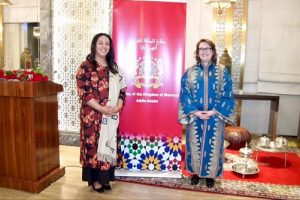BY MULUGETA GUDETA
The African Union’s Economic, Social, and Cultural Council recently launched the second edition of the Young Africans Writing Contest that aims to bridge the gap between African youth and the Union, according to a report by Ethiopian Monitor newspaper. According to the same report, the contest was started last year with the objective of empowering youths to reflect on their contributions to the advancement of the continent and provides them with a free space to articulate their dreams and new visions.
African youths are a force to reckon with as the population of young Africans is expected to double from the current 480 million to 840 million by 2050, making Africa the youngest population. Unfortunately, millions of young Africans are on the move across national and international borders and the problem of mass migration has inspired many African writers to write about the sufferings, trials and tribulations of African youth as their cross oceans and deserts in their quest for a better future for themselves and their people.
Migration and the African Diaspora experience has become the single most burning issue to the extent that it is dealt with by veteran and young African authors. That is apparently why in this year’s contest, the YAWC was launched under a theme, ‘Children and Migration’, specifically ‘Children on the Move’ in a bid to encourage the youth to reflect on children and migration issues on Africa.
Even before the launching of the literary context for young Africans, many outstanding African authors have dealt with the theme of migration, poverty, dictatorship, alienation and the African Diaspora experience. These issues are taking increasingly more space in modern African literature that has passed through many stages before reaching the present modern period.
For analytical purpose, we can divide the development of African literature into three major periods. The first is the pre-colonial period when African literature was expressed in the form of folklore. The common theme running through most African oral literature or folk tales was, according to available information, is the tale of small animal which tricks larger creatures in order to survive. However, written African literature dates back to the fourth century AD. The Kibre Negest or “the Book of Kings” which was written in Ethiopia is considered the oldest written African literature.
The common theme running through Africa’s colonial period was, according to the Encyclopedia Britannica, “the slave narrative, often written in English or French for western audiences. Among the first pieces of African literature to receive significant worldwide critical acclaim was Things Fall Apart, by Chinua Achebe, published in 1958. African literature in the late colonial period increasingly features themes of liberation and independence.
According to the same Encyclopedia article, “Post-colonial literature has become increasingly diverse, with some writers returning to their native languages. Common themes include the clash between past and present, tradition and modernity, self and community, as well as politics and development. On the whole, female writers are today far better represented in African literature than they were prior to independence”
In the last few decades, African literature has witnessed a real breakthrough and international recognition for its modernity, sophistication and the complexity of issues African writers dealt with in their works. Many African writers have won prestigious international prizes such as the Booker Prize in Britain and the Nobel Prize, the highest literary accolade any worthy writer in Africa could ever dream of.
As Africa can no more be ignored by the outside world, as far as its history, politics and culture are concerned, the continent could no more be shunned for its literary achievements that are increasingly embraced by the entire intellectual and literary establishment.
If we take African countries individually, their achievements may not be impressive. But, if we take Africa as a continent with a common vision, African literature makes a big impact by dealing with the complexities of a continent that is forging ahead in every field of human activities, and tries to find its own path to the future. African writers as a whole are coming forward and producing impressive works of literature on the basis of the achievements of the veteran authors who have put Africa on the map of world literature.
Among the veteran writers who have given inspiration to the rising stars of African literature are of course Chinua Achebe and Ngugi wa Thiong’o, to name but two of them. No doubt that the late Chinua Achebe paved the way for the rise of writers like Ngugi wa Thiong’o by shaping African literature according to the themes and forms that shaped the lives of most colonized Africans and the black diaspora as a whole.
According to a recent study of his works, “Ngugi established himself with a series of novels published in the 1960s: Weep Not, Child (1964), The River Between (1965) and A Grain of Wheat (1967). His combination of a distinctive prose style with provocative subject matter would come to define other works now considered canonical texts of African literature.
These include Petals of Blood (1977), the play Ngaahika Ndeenda (I Will Marry When I Want) (1977) and Caitani Mutharabaini (1981), later translated into English as Devil on the Cross (1982). Volumes of essays and reflections, such as Decolonising the Mind (1986), Penpoints, Gunpoints and Dreams (1998), as well as his prison memoir, Detained (1981), have also been influential for generations of readers and scholars alike. In 2004, he published his leviathan Gikuyu-language novel, Murogi wa Kagogo, translated as Wizard of the Crow.”
Ngugi is not of course the only notable African writer that has made an impact on African and world literature. One cannot overlook the giant of African letters and winner of the coveted Nobel Prize, Wole Soyinka whose energies never seem to be exhausted as he recently produced a monumental novel about modern Nigeria in his eighties. Soyinka’s life is devoted to modern Nigeria and by extension Africa and their challenges under the rules of the various elite groups that took control of their destinies.
There is also the celebrated Somali writer Nuredin Farah Born in Baidoa in what was Italian Somaliland in 1945 Farah has produced a series of novels, plays, essays and journalistic reflections on his native Somalia. His first novel, From a Crooked Rib (1970), established his concern with the particular struggles of women in the Horn of Africa. This has only endured and intensified throughout his more than 40-year career. To date, Farah has written three novelistic trilogies.
The first, Variations on the Theme of an African Dictatorship, comprising Sweet and Sour Milk (1979), Sardines (1981) and Close Sesame (1983), offers a quasi-Orwellian portrait of life under autocratic power.
The second, Blood in the Sun, featuring Maps (1986), Gifts (1992) and Secrets (1998), is set against the backdrop of civil conflict and famine in Somalia.
The most recent, Past Imperfect, made up of Links (2004), Knots (2007) and Crossbones (2011), provides a fictional exploration of everything from the botched US-led Operation Restore Hope to contemporary debates about international piracy.
Among the new crops of modern women African writers figure Chimamanda Adichie is widely regarded as one of the most important voices to have emerged in contemporary African literature and has been the recipient of numerous prestigious awards.
Adichie is often spoken of in the same breath as Achebe, with many believing she has assumed his creative mantel. While meant as a form of tribute, such comparisons run the risk of deflecting attention from the singularity of Adichie’s authorial voice and vision.
With the publication of Half of a Yellow Sun in 2006, for instance, she explored the Biafran War that was so central to Achebe’s literary project, among many others. But there is no sense in which the novel is imitative, with its commercial and critical success confirming Adichie’s unique presence on the global literary stage.
As an author who divides her time between Nigeria and the US, she has drawn on her own experiences in a collection of short stories titled The Thing Around Your Neck (2009), as well as her most recent novel, Americanah (2013). On the basis of her achievements to date, many predict Adichie’s status and profile will continue to grow.
Ethiopia has not produced many female writers of international stature. Hannah Giorgis is a staff writer at The Atlantic. She is “The daughter of Ethiopian immigrants, she lives in Brooklyn by way of Southern California. Her criticism and reporting have appeared in publications including the New York Times magazine, The Guardian, and Pitchfork. Hannah’s short stories have appeared in the Addis Ababa Noir anthology, the Lifted Brow literary journal, and SPOOK magazine.”
The second edition of the Young Africans Writing Contest might as well bring new and young Ethiopian writers into the limelight as it has done in the past with novelist Maaza Mengiste who was shortlisted for the Booker Prize.
The Ethiopian Herald 21 August 2022





